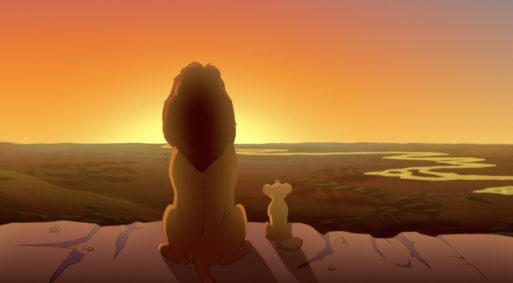
When “The Lion King” first appeared in theaters in 1994, it was a cut above Disney’s prior animated feature films in terms of music, character development and lessons about life and death.
Mufasa’s untimely death in the first act of the film was notable not only because it was the first time many children watching would witness a cinematic portrayal of death, but also because it wasn’t Scar the villain who met his end in a stampede of wildebeests. It was Mufasa — the hero, the king, the good father. The viewer is confronted with the cold truth that bad things happen to good people (or lions, as it were) and that death is permanent and irreversible. Mufasa isn’t sleeping encased in a glass coffin, awaiting the kiss of some princely lion to revive him.
“Dad,” Simba pleads to Mufasa’s lifeless body, “Dad, come on, you gotta get up.” We, along with Simba, learn that Mufasa won’t ever get up again. Along with Simba, we also learn about the grieving process and the complex emotions that arise in the wake of losing a loved one.
“The Lion King” reflects the life-long impact the death of a parent can have on a child. Overcome with guilt because he believes he’s responsible for his father’s death, Simba runs away from his pride, his home and his expected role as heir to his father’s kingdom. He comes of age far away from home, in the company of his new friends Timon and Pumba, who promise him a lifetime of carefree living if he embraces their Hakuna Matata philosophy.

Credit: ohmydisney.com
But then Simba’s past comes knocking. His childhood friend Nala appears to confront him with the dismal mess the pride has become in Simba’s absence. She begs him to come home and fulfill his kingly duties.
Nala’s admonitions provoke Simba’s dormant feelings of anger about the loss of his father, catalyzing him to confront and move through his grief. An apparition of Mufasa appears, urging Simba to return home and assume the role of king.
In the end, the wise nudging of Simba’s baboon friend Rafiki helps Simba learn two important lessons. The first is that our loved ones are never entirely gone as their spirits live on through us. And the second is that we can’t run from our pasts. As Rafiki says, “The past can hurt. But from the way I see it, you can either run from it or… learn from it.” Simba chooses to learn from what has happened, ultimately returning home to lead his pride.

 “The Lion King” by Disney, Rob Minkoff and Roger Allers
“The Lion King” by Disney, Rob Minkoff and Roger Allers


 First the Wealth Gap, Now the U.S. Has a Growing Health Gap
First the Wealth Gap, Now the U.S. Has a Growing Health Gap
 How to Comfort A Dying Loved One
How to Comfort A Dying Loved One
 Our Annual Seven Holiday Gifts for Someone Who Is Grieving, 2024 Edition
Our Annual Seven Holiday Gifts for Someone Who Is Grieving, 2024 Edition














